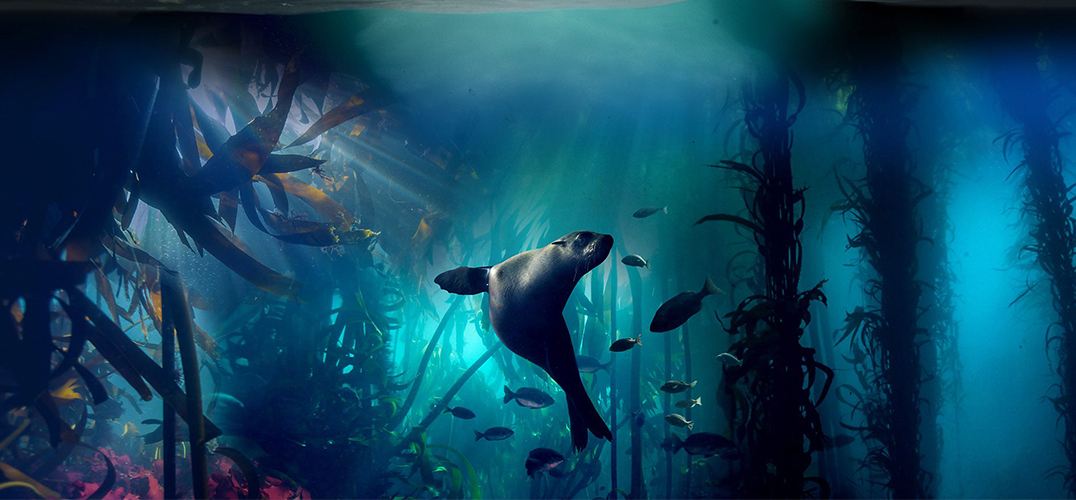You know, as your note dies away, just look at, you know, whoever’s sitting next to you — let them swell in their note.
你演奏的音符逐渐停下来就示意你旁边的人开始他们的演奏。
… And you get these beautiful sort of waves, and just for a moment, the individual player is heard and then sinks back into you know, the mass.
这样演奏出来就有一种波浪的效果,也就是说,某个时刻我们可以听出独立的演奏,这种演奏叠加在一起就是整首曲子。
It's exactly what they form, if you look at the ocean long enough,
就是那种效果。如果大家有长时间观察大海的话,
that’s exactly what it does, in terms of, back to the pointillism things, it's basically, if you really look at it, it’s triangles that come in and out, and seep in and out all the time.
就会发现那刚好是大海的特性,说到这里,我们又要回到点画法上了,如果大家认真观察的话,就会发现大海就是无数的三角前赴后继,不断地前进后退前进后退。
And they never stop, they never never never stop.
永不停息,永远永远永远不会停息。
Think of it like a musical version of mathematician John Conway’s Game of Life —
我们不妨把它想成数学家约翰·康威发明的生命游戏的音乐形式。
there’s a basic rule about when a note dies, when it remains, and when it reproduces.
音符什么时候淡出,什么时候延续,什么时候重复都有基本的要求。
Let that play out, and the orchestra takes on an organic feeling.
这样演奏出来的交响乐就有了生命力。
This track follows in a rich tradition of using randomness in music.
这条音轨延续了随机演奏这一悠久的传统演奏方式。
As far back as the 1700s, compositional dice games were quite popular.
十八世纪,作曲掷骰子游戏风靡一时。
Players would roll dice to generate a song based on pre-composed musical fragments, and then perform it.
演奏时,乐手们会通过掷骰子的方式决定按怎样的顺序演奏事先写好的一个个片段。
In 1953, composer Earle Brown wrote a piece called Twenty-Five Pages —
1953年,作曲家厄尔·布朗写了一首名为《25页》的曲子——
it’s an unnumbered set of pages of music that can be played in any order,
这是一首没有标页码,能够按任意顺序演奏的曲子,
with either side up, and with notes read as either treble or bass clef.
不管是倒过来演奏,当成高音谱号来演奏还是当成低音谱号演奏都可以。
Shortly after, Karlheinz Stockhausen wrote Klavierstück XI, where a performer can pick from 19 segments randomly —
不久之后,卡尔海因茨·施托克豪森就写出了那首可以从19个片段中任意选择片段演奏的《钢琴作品第11首》
the song is over after they’ve played one fragment three times.
一个片段演奏三次之后这首曲子就算演奏完了。
And in 1964, composer Terry Riley wrote “In C”.
1964年,作曲家特里·赖利创作了《在C里》。

It’s a series of 53 short musical phrases that players can move through at their own pace, weaving in and out of sync.
这是一串由53个小节组成,乐手们可以按照自己的节奏同步演奏的曲子。
Music like this is called “aleatoric” — it’s when a part of the composition or performance is left up to chance, or to a player’s choices.
这种类型的音乐就是所谓的“偶然音乐”——就是在演奏或表演部分片段时融入一定的随机性,或者给演奏者一定的自由发挥空间。
The “Ocean Bloom” rework makes those choices available on an orchestral level,
(Ocean) Bloom这首二次创作的曲子将这一手法普及到了交响乐中。
but it's an effect that was already part of the original Radiohead track.
但Radiohead乐队原来的曲子里就已经实现这一效果了。
You can hear it when you take away the drums, which is exactly what Thom did at a performance in Paris in 2016.
我们把鼓点拿掉之后就能听出原歌的这种效果,2016年Thom在巴黎演奏时就是这么做的。
I thought hang on, maybe I can do it on piano and came up with a way of really crude way to play on piano.
当时我灵光一闪,想到,且慢,我是不是可以用钢琴来演奏这一段?然后我就用非常生硬的手法弹了那一段。
Which was kind of discovering the song again, in a super simple way.
那一次我可以说是重新认识了那首歌,而且是用最最简单的方式。
Because up until that point, it had always been about the rhythms that shift in and out, and fall apart.
因为在那之前,演奏一直都会有节奏的进出,不协调
Fall apart. Sometimes come together if we're lucky. Usually fall apart. Usually fall apart.
不协调,幸运的话也是能达到协调的效果的,但一般都不协调,说的没错。
It's very interesting hearing Thom talk about the piano version, because that had a similar sort of, degree of randomness,
听Thom聊钢琴演奏部分感觉很有趣,因为钢琴演奏也有那种随机性。
You have to building all those loops on the piano and that's just...Didn't know what I was doing. You see the song in a different way.
你得弹出那种循环的感觉,恰好……其实我也是懵的,恰好多了一个解读的视角。
And yeah it’s interesting how such a small scale thing that Thom is doing is sort of, you know, you’re subconsciously doing the same thing.
是的,没错,好玩的地方就在于Thom做的那种非常细节的东西,你们俩,你们俩其实是不谋而合了。
But with a huge orchestra.
只不过你用的是大型的交响乐。
As soon as you have an orchestra involved, the complexity of that, all these players playing together, that’s the glorious thing.
一旦到了交响乐这么复杂的层面,所有的乐手们一起演奏出这种效果,这才是让人拍手称奇的地方
There’s no sound like it.
那种效果是其他任何东西都模拟不出来的。
I think that's why it sounds, you know, so vital.
在我看来,这恰好是(Ocean) Bloom用交响乐演奏出来能那么有活力的原因。
Blue Planet II airs from October 29th on BBC One in the UK and is coming soon to BBC America in 2018.
《蓝色星球II》将于10月29日在BBC-1在英国播出,很快也将于2018年在BBC美国频道播出。


